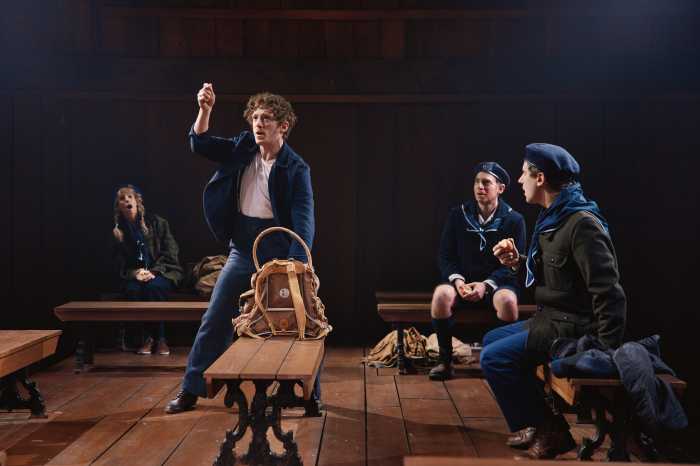Unlike many movies and TV shows about teenagers, Canadian directors Sarah Watts and Mike Slutsky’s “You Can Live Forever” might be most appreciated by actual youth. Watts, a lesbian who grew up as a Jehovah’s Witness, says that it’s the film she wished she could have seen when she was a teen herself in the ‘90s, although the story is not inspired by her personal experiences. It’s a gentle, delicate film, driven forward by small touches. Set in a Quebec community of Jehovah’s Witnesses where two teenage girls fall in love with each other, it shows the impact of religious repression with great restraint. The film does not avoid the damage done by religious conservatives, but nor does it scoff at their faith or even express much anger.
In 1992, Jaime (Anwen O’Driscoll) is 16. Although she’s lesbian, she’s kept this a secret from her parents. Her life is turned upside down overnight when her father dies. Because her mother grows so mentally unstable that she’s incapable of raising Jaime, she sends her daughter off to live with her aunt Beth (Liane Balaban) and uncle Jean-François (Antoine Yared). Both are Jehovah’s Witnesses. While Jaime is rather skeptical and does not want to embrace the religion, she goes along to church with them, meeting the devout Marike (June Laporte.) Their signs of attraction to each other are subtle but unmistakable. They gaze longingly at each other, and Marike wraps her arm over Jaime when they sleep in the same bed. Jaime is much more rebellious, jealous of her friend Nate’s (Hasani Freeman) ability to get high and play video games in his parents’ basement with no supervision. Marike believes in the Jehovah’s Witness doctrine of an eternal life, which supplies the title “You Can Live Forever.” Still, the girls’ love becomes impossible to ignore for their community, where gayness is punished by complete expulsion and heterosexual marriage and childrearing are compulsory.
The color design of “You Can Live Forever” slowly moves from somber shades to brighter ones. In fact, the early scenes, although almost entirely set indoors, take on the color of fallen leaves. The houses are quite warm and inviting, with lighting and costumes bringing out green and sepia tones. At a Jehovah’s Witness service, the colors turn garish and start to clash.
Looking back on her youth, Watts recalls, “As a teenager, I was eager to see a story with a character who even remotely resembled me on the movie screen. But I was always disappointed. When there were lesbian characters they were inevitably used as plot points and usually died tragic deaths.”
Movie references play a subtle but crucial role in “You Can Live Forever.” Going out with a group of friends, Jaime and Marike see Francis Ford Coppola’s “Bram Stoker’s Dracula.” Forbidden from seeing movies by the rules of their community, they use the opportunity for their first makeout session in the theater’s bathroom. However, the film’s choice of “Dracula” riffs off on the long-running theme of predatory lesbian vampires, from Sheridan le Fanu’s 1872 short story “Carmilla” to movies like Tod Browning’s “The Devil’s Daughter” and Tony Scott’s “The Hunger.” A few years down the road, a poster for Peter Jackson’s 1994 “Heavenly Creatures” decorates Jaime’s college dorm room. Its tale of teenage girls whose obsessive love for each other ends in a murder both seems like something that would appeal to Jaime and a great exaggeration of the more prosaic, less physically dangerous details of her relationship with Marike.
“You Can Live Forever” sketches in the ‘90s period tastefully. The fashions of the time are reflected in Jaime’s taste for flannel and alternative rock band T-shirts (as well as the Breeders’ “Divine Hammer” on a car radio.) She hides a joint inside a cassette case. Akin to the film references, her interest in music means something larger culturally. Seeing her Siouxsie & the Banshees shirt, Jean-François says he saw the band live before becoming a Jehovah’s Witness, hinting at a much more open past life.
The story beats of “You Can Live Forever” are a bit predictable, especially when it turns more pessimistic. Nonetheless, its tone stays consistent. Hardly anyone is rude enough to raise their voice, yet adults’ power over Jaime and Marike can’t be dodged. The characters are polite without always being genuinely kind. The passion that led Watts and Slutsky to make the kind of lesbian film that barely existed in her youth bleeds through the smooth surfaces.
“You Can Live Forever” | Directed by Sarah Watts and Mike Slutsky | Good Deed Entertainment | In English and French with English subtitles | Opens May 5th at Village East by Angelika



































